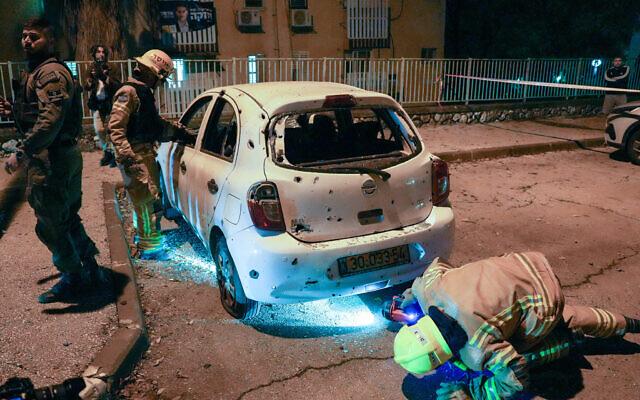
Northern towns rocked by heaviest Hezbollah barrages since outbreak of war
Sirens sounded repeatedly in northern Israel on Wednesday as rockets fired from Lebanon pummeled the towns of Rosh Hanikra and Kiryat Shmona in a major escalation of violence along the restive border, as Israel’s top general vowed that the country’s military was prepared to battle the Hezbollah terror group, even as heavy fighting persisted in Gaza.
No injuries were reported in the attacks, which apparently marked the most intense volleys on northern Israel since the region was plunged into war on October 7. Israel responded to the attacks with airstrikes in southern Lebanon.
The uptick came after an alleged Israeli strike killed a Hezbollah member, as well as his brother and his brother’s wife, and with Iran vowing revenge for the killing of a senior Islamic Revolutionary Guard Corps officer in Syria, which it has blamed on Israel.
At least 18 rockets were fired at coastal Rosh Hanikra at around 10 a.m. on Wednesday, in an attack that Hezbollah claimed was aimed at an Israeli Navy base in the area. At least six of the rockets were said to have been intercepted by the Iron Dome air defense system, with several others falling in open areas.
Several hours later, a second barrage was fired at the city of Kiryat Shmona. Six of the rockets impacted inside the city, causing damage to residential buildings and infrastructure, while another four landed in open areas within the municipal boundary, officials said. An additional three rockets were intercepted by the Iron Dome, with the remainder landing in open areas.
Authorities in Kiryat Shmona said that at least 16 rockets were fired at the city, although Hezbollah claimed to have launched 30 in total.
The city, normally home to over 20,000 people, has been largely evacuated in recent months, along with other towns near Israel’s border, due to near-daily rocket, missile and drone attacks launched by Hezbollah and allied groups.
Hezbollah claimed responsibility for the rocket barrages, as well as for three explosive-laden drones that hit the Mount Dov area, where several IDF positions are located, saying that they had launched the attacks “in response to the enemy’s repeated crimes.”
Visiting Northern Command headquarters on Wednesday, IDF Chief of Staff Lt. Gen. Herzi Halevi said that the military is “at a very high level of readiness” amid escalating Hezbollah attacks.
“Our first task is to return residents safely, and that will take time. Today we approved a variety of plans for the future, and we need to be ready for an offensive, if necessary,” he said in remarks provided by the IDF.
“The IDF and within it the Northern Command are at a very high level of readiness. So far, the campaign here has been managed correctly and meticulously, and this is how it should continue. We will not return the residents without security and a sense of security,” he added.
According to a security official speaking to Reuters news agency, Hezbollah fired more rockets and drones on Wednesday than it had on any other day since it the daily skirmishes began.
In response to the heavy fire from southern Lebanon, Israeli fighter jets struck the launch site of the drone attack, as well as other targets close to the border, the IDF said in a statement.
The near-daily clashes on Israel’s northern border began following Hamas’s deadly onslaught inside Israel on October 7 and the subsequent war in Gaza through which Israel has vowed to eliminate the Palestinian terror group. Along with allied Palestinian factions along the Lebanon border, Hezbollah has said that it is carrying out attacks on Israel in a show of support for the people of Gaza.
Iran-backed groups in Yemen, Iraq and Syria have also attacked Israel and US troops in the region repeatedly since October 7, in what is widely seen as a bid to stretch military forces thin as Israel battles Hamas in Gaza.
Four civilians and nine soldiers have been killed in attacks on the northern border, which have included dozens of anti-tank missile attacks. There have also been several rocket attacks from Syria, without any injuries.
Hezbollah has named 129 members who have been killed by Israel during the ongoing skirmishes, mostly in Lebanon but some also in Syria. In Lebanon, another 16 Palestinian terror operatives, a Lebanese soldier and at least 19 civilians, three of whom were journalists, have been killed.
A strike on the southern city of Bint Jbeil late Tuesday night attributed to Israel killed three people, according to Lebanese media, two of them civilians.
According to the country’s state-run National News Agency, the bodies of Ibrahim Bazzi, his wife Shorouk Hammoud, and Ibrahim’s brother, Ali Bazzi, were pulled from the rubble of their destroyed home.
Another member of the family was reportedly wounded.
Ibrahim Bazzi was identified by one of his relatives as a Lebanese-Australian dual citizen. Although family members in the village alleged that Ali Bazzi was a civilian, Hezbollah put out a statement announcing his death as a “martyr on the road to Jerusalem,” as it typically does when one of its fighters is killed.
Ibrahim Bazzi was said to have lived in Sydney and was only in Lebanon to visit his wife Hammoud, who just recently received a travel visa for Australia and so was not yet living with her husband.
Asked about the incident, the Israeli military said one of its jets had struck a Hezbollah military site overnight in Lebanon. Australian media quoted a spokesperson for Australia’s foreign ministry as saying it was aware of the report and was seeking confirmation.
Bint Jbeil is a Hezbollah stronghold and large parts of it were destroyed during the 2006 war between Israel and the Iran-backed terror group.
Source » timesofisrael.com





